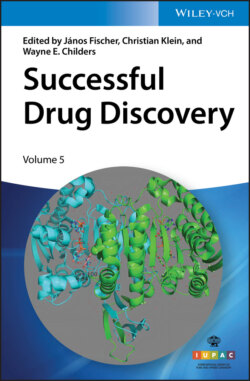Читать книгу Successful Drug Discovery, Volume 5 - Группа авторов - Страница 33
1.6.4 Sunitinib
ОглавлениеInhibition of kinases, albeit omnipresent these days, is still a therapeutic principle known for less than 50 years. In 1986, Umezawa [121] reported erbstatin (Figure 1.17) as the first kinase inhibitor, targeting epidermal growth factor receptor. Because of high intracellular ATP concentrations, kinases were at that time widely believed to be undruggable. Achieving specificity seemed another impossible task considering the vast number of different kinases in the human body. However, in 1991, Joseph Schlessinger (Yale University) and Axel Ullrich (Max Planck Institute for Biochemistry in Martinsried) decided to start a company called Sugen, resulting from a collaboration of the two laboratories. The name Sugen is composed of the initials of the last names of the two founders, Schlessinger and Ullrich, combined with the suffix gen as an abbreviation for genetics. The company was dedicated to developing anticancer drugs by manipulating intracellular signaling pathways and targeting kinases and phosphatases. In 1994 they filed the first IND for SU101 (Figure 1.17) targeting different cancer indications; however, it turned out that the structure of SU101 coincided that of leflunomide, which was under development by Hoechst Marion Roussell. The kinase inhibitory activity of SU101 was modest, in fact, the observed antiproliferative activity could later be linked to an active metabolite. Clinical development of SU101 failed and Sugen focused on another chemical series, the oxindoles. Cellular profiling and structure‐based design using X‐ray crystallographic data of SU5402 and SU6668 (Figure 1.17) in complex with the kinase domain of the Fibroblast Growth Factor (FGF) receptor [122] guided compound optimization. Sugen was acquired by Pharmacia & Upjohn in 1999 but continued research in a mainly autonomous manner. They progressed multiple compounds to clinical trials. One of them (SU11248, Figure 1.18) received FDA approval as sunitinib in 2006. Another compound, SU11654 (toceranib, Figure 1.18) received approval for treatment of canine tumors. Upon acquisition of Pharmacia by Pfizer in 2003, Sugen was closed. In testimony of Sugen's success, it is interesting to note that crizotinib, an anticancer drug marketed by Pfizer, also originated in the Sugen laboratories.
Figure 1.17 Kinase inhibitors developed by Sugen.
